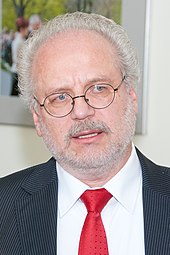President of Latvia
| President of Latvia | |

|
|
| Flag of the president | |

|
|
|
Acting President Egils Levits since July 8, 2019, term of office ends on July 8, 2023 |
|
| Official seat | Riga Castle in Riga |
| Term of office | 4 years (re-election possible once) |
| Creation of office | November 14, 1922 |
| Last choice | 29 May 2019 |
| website | www.president.lv |
The president of Latvia ( Latvian Latvijas Valsts prezidents ) is the head of state of the Baltic state of Latvia . He resides in the Riga Castle in the capital Riga . The current president is Egils Levits .
Constitutional position
According to the current 1992 constitution , the president is the head of state. He represents the Latvian state under international law.
Competencies
The President has the following powers and duties:
- he certifies the Latvian and receives the foreign diplomatic representatives
- signs the ratification of international treaties resolved by parliament
- has supreme command of the armed forces ; in times of war he appoints his own commander in chief
- can declare a state of war by prior resolution of parliament
- has the right to take the necessary military defensive measures when a foreign country declares war on Latvia or the enemy has crossed the Latvian borders; at the same time he has to summon parliament immediately, which decides on the declaration of war and the start of hostilities
- has the right to pardon criminals over whom the judgment has come into force
- has the right to summon and chair extraordinary sessions of the Cabinet of Ministers with predetermined agendas
- has the right to propose legislation
Dissolution of parliament
The President has the option of requesting early dissolution of Parliament (Saeima) . If he does so, a referendum takes place immediately afterwards, in which the eligible voters can vote for or against the dissolution of parliament.
If a majority votes in favor of dissolving parliament, it is considered dissolved and new elections must be held within two months . The previous members of the dissolved parliament, however, retain their mandate until the newly elected parliament is constituted. The previous parliament can only meet if the President calls it up. The agenda of such meetings is then set by the President. If a majority of the voters are against the dissolution of parliament, the president is to be regarded as deposed and the parliament has to elect a new president for the time remaining from the term of office of the deposed president.
choice
The president is elected for a term of four years. This is elected by parliament in a secret ballot with a majority of at least 51 votes of the 100 members.
Only fully entitled citizens of Latvia who have reached the age of forty can be elected . Anyone who has a second nationality cannot be elected.
The office of president is not compatible with any other office. If a person is elected president who is a member of parliament, he or she must resign from his / her mandate. The same person may not serve for more than eight consecutive years.
Swearing in
When taking office, the elected President must take the following oath in Parliament :
“Es zvēru, ka viss mans darbs būs veltīts Latvijas tautas labumam. Es darīšu visu, kas stāvēs manos spēkos, lai sekmētu Latvijas valsts un tās iedzīvotāju labklājību. Es turēšu svētus un ievērošu Latvijas Satversmi un valsts likumus. Pret visiem es izturēšos taisni un savus pienākumus izpildīšu pēc labākās apziņas. "
“I swear that everything I do will be devoted to the benefit of the Latvian people. I will do everything I can to promote the welfare of the Latvian state and its people. I will respect and obey the Constitution of Latvia and state laws. I will be fair to everyone and fulfill my duties to the best of my knowledge. "
Vacancy and incapacity
If the President resigns from office, dies or if he is recalled before the expiry of the term of office, the President of Parliament will act until new presidential elections are held. The President of Parliament also has to represent the President if he is outside the state borders or is otherwise prevented from performing his official duties.
Criminal responsibility
The President can only be held criminally responsible with the consent of a two-thirds majority in Parliament.
Deposition
At the suggestion of at least half of the members of parliament, parliament can decide in closed session with a two-thirds majority to remove the president. After this decision, Parliament has to elect a new President immediately.
See also
Web links
- Official website of the President of Latvia (Latvian, English, Russian)
- German language edition of the Constitution of the Republic of Latvia from 1992 www.verfassungen.eu
